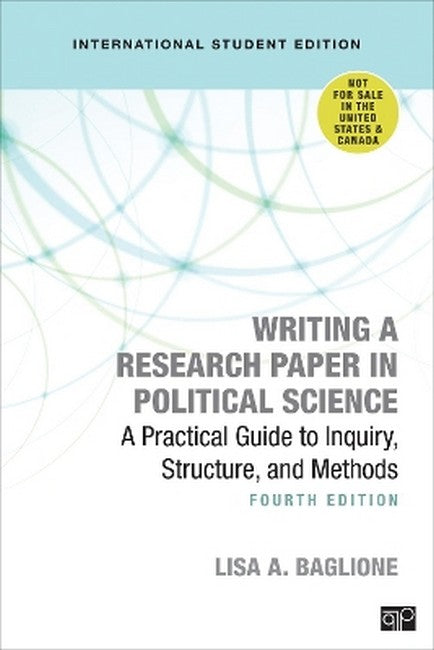Dr. Lisa A. Baglione is a professor in the Department of Political Science and a member of the International Relations Program at Saint Joseph's University in Philadelphia. Currently, Dr. Baglione also serves as the co-director of the Gender Studies Program. During her career, Dr. Baglione has conducted research in five areas, and while they are varied, she has benefited from the ways that insights from each have interwoven: negotiations between adversaries, authoritarian transformation, peacebuilding, gender in politics, and pedagogy. She has published two other books, To Agree or Not to Agree: Leadership, Bargaining, and Arms Control with University of Michigan Press and Writing a Research Paper in Political Science: A Practical Guide to Inquiry, Structure, and Methods, now in its fourth edition, with Sage.
Request Academic Copy
Please copy the ISBN for submitting review copy form
Description
PREFACE CHAPTER 1: So You Have to Write a Research Paper What Is a Research Paper? A Few Helpful Metaphors What Research Paper Writing Entails Blueprint of the Book CHAPTER 2: Getting Started: Finding a Research Question Characteristics of a Good Question Practical Summary Recipe 1: The Research Question Exercises CHAPTER 3: Learning Proper Citation Forms, Finding the Scholarly Debate, and Summarizing and Classifying Arguments: The Annotated Bibliography What Are Bibliographies, and Why Do We Bother With Them? Plagiarism versus Paraphrasing and Avoiding Drop-Ins and Transcripts, Too Annotating the Bibliography Identifying the Key Conceptual Issues Searching for Sources Identifying Similar Arguments and Grouping Your Sources One Last Word of Advice: Generic Schools of Thought Writing the Annotated Bibliography Practical Summary Recipe 2: The Annotated Bibliography Exercises CHAPTER 4: Making Sense of the Scholarly Answers to Your Research Question: Writing the Literature Review Preparing for and Understanding the Literature Review The Fundamentals of the Literature Review Writing the Literature Review Practical Summary Recipe 3: Literature Review Exercises CHAPTER 5: Effectively Distilling Your Argument: The Thesis, Model and Hypothesis The Thesis The Model The Hypothesis Applying These Insights Recipe 4: Model and Hypothesis Section Exercises CHAPTER 6: Revising and Editing Your Work: The Research-Writing-Thinking Spiral Practical Summary Recipe 5: Revising and Editing Exercises CHAPTER 7: Making Your Plan and Protecting Yourself from Criticism: The Research Design Research Design: The Courtroom and Medical Science Analogies Writing the Research Design Focusing on Hypothesis-Driven Research The Research Design: Two Examples Practical Summary Recipe 6: Research Design Exercises CHAPTER 8: Evaluating the Argument: The Analysis and Assessment Section Qualitative Analysis Mixed (Qualitative and Quantitative) Analysis Quantitative Analysis Practical Summary Recipe 7: Analysis and Assessment Exercises CHAPTER 9: Bringing the Paper Together in Three Essential Ways: The Conclusion, Introduction and Title Considering the Significance and Limitations of Your Findings: The Conclusion Writing a Good Introduction A Last Element in Attracting Readers: Developing an Appealing Title Almost Done: Writing an Abstract and Giving a Presentation Are You Done? The Joy (and Continued Responsibilities) of Finalizing Your Draft Practical Summary Recipe 8: Conclusion, Introduction, and Title Exercises BIBLIOGRAPHY INDEX

